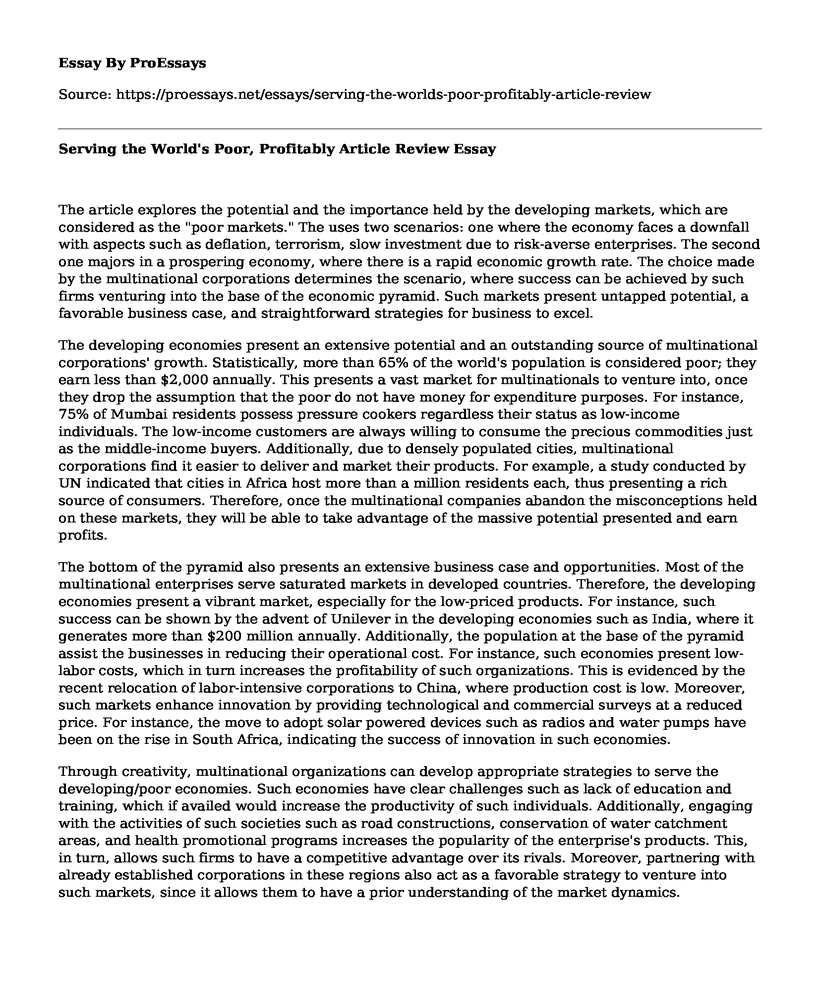The article explores the potential and the importance held by the developing markets, which are considered as the "poor markets." The uses two scenarios: one where the economy faces a downfall with aspects such as deflation, terrorism, slow investment due to risk-averse enterprises. The second one majors in a prospering economy, where there is a rapid economic growth rate. The choice made by the multinational corporations determines the scenario, where success can be achieved by such firms venturing into the base of the economic pyramid. Such markets present untapped potential, a favorable business case, and straightforward strategies for business to excel.
The developing economies present an extensive potential and an outstanding source of multinational corporations' growth. Statistically, more than 65% of the world's population is considered poor; they earn less than $2,000 annually. This presents a vast market for multinationals to venture into, once they drop the assumption that the poor do not have money for expenditure purposes. For instance, 75% of Mumbai residents possess pressure cookers regardless their status as low-income individuals. The low-income customers are always willing to consume the precious commodities just as the middle-income buyers. Additionally, due to densely populated cities, multinational corporations find it easier to deliver and market their products. For example, a study conducted by UN indicated that cities in Africa host more than a million residents each, thus presenting a rich source of consumers. Therefore, once the multinational companies abandon the misconceptions held on these markets, they will be able to take advantage of the massive potential presented and earn profits.
The bottom of the pyramid also presents an extensive business case and opportunities. Most of the multinational enterprises serve saturated markets in developed countries. Therefore, the developing economies present a vibrant market, especially for the low-priced products. For instance, such success can be shown by the advent of Unilever in the developing economies such as India, where it generates more than $200 million annually. Additionally, the population at the base of the pyramid assist the businesses in reducing their operational cost. For instance, such economies present low-labor costs, which in turn increases the profitability of such organizations. This is evidenced by the recent relocation of labor-intensive corporations to China, where production cost is low. Moreover, such markets enhance innovation by providing technological and commercial surveys at a reduced price. For instance, the move to adopt solar powered devices such as radios and water pumps have been on the rise in South Africa, indicating the success of innovation in such economies.
Through creativity, multinational organizations can develop appropriate strategies to serve the developing/poor economies. Such economies have clear challenges such as lack of education and training, which if availed would increase the productivity of such individuals. Additionally, engaging with the activities of such societies such as road constructions, conservation of water catchment areas, and health promotional programs increases the popularity of the enterprise's products. This, in turn, allows such firms to have a competitive advantage over its rivals. Moreover, partnering with already established corporations in these regions also act as a favorable strategy to venture into such markets, since it allows them to have a prior understanding of the market dynamics.Conclusion
In conclusion, the "poor" markets present untapped potential, a favorable business case, and straightforward strategies for business to excel. Statistically, more than 65% of the world earn less than $2,000 annually, thus presents a vast market for multinationals. Additionally, developing economies offers a vibrant market especially for the low-priced products and also exhibit clear challenges such as lack of education and training. Once an enterprise meets these conditions, they are assured of success in perceived poor markets.
Cite this page
Serving the World's Poor, Profitably Article Review. (2022, Mar 29). Retrieved from https://proessays.net/essays/serving-the-worlds-poor-profitably-article-review
If you are the original author of this essay and no longer wish to have it published on the ProEssays website, please click below to request its removal:
- Globalization and Its Profound Implication on the Domestic Employment
- Essay Sample on Globalization's Cultural Challenges: Diversity, EEO & AA
- Successful Employee Management Practices: Retention, Empowerment & Incentives - Essay Sample
- Essay Example on Steelworkers' Oral Histories: Empowerment Through Companionship
- Essay Example on Multiemployer Pension Reform Act of 2014: Pension Reduction Benefits
- Free Essay Sample on Exploring Communication Through Technology
- Report Sample on Employment Laws in the COVID-19 Era







